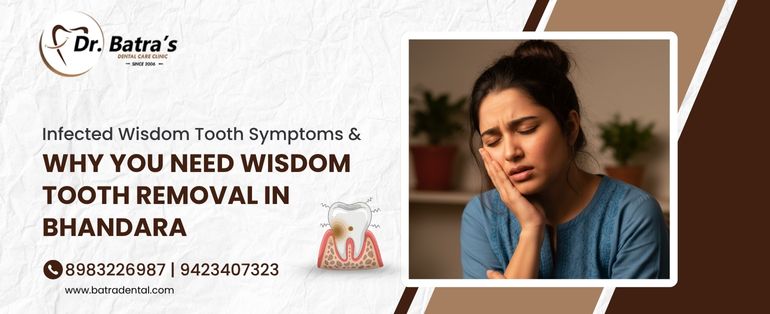
They say guests and wisdom teeth have something in common; both show up uninvited and somehow manage to throw everything off balance. Life is going just fine, your teeth are working in perfect sync, and then one day this late arrival decides to make an appearance. Suddenly, the balance is gone — chewing feels awkward, the gums start protesting, and even opening your mouth feels like an effort.
That’s what happens when a wisdom tooth tries to squeeze into a system that’s already working perfectly. It disrupts the order, presses against the neighbors, and before long, pain and swelling start setting in like an unwanted commotion in an otherwise peaceful house.
If that sounds familiar, your mouth might be dealing with more than just a stubborn molar — it could be an infection starting to brew. That’s when timely care becomes not just relief, but a necessity. And that’s exactly why we offer safe and effective wisdom tooth removal in Bhandara at Dr. Batra’s Dental Care Clinic.
Wisdom teeth, or third molars, are like those guests who show up when the party’s already over — late and unplanned for. They usually arrive between ages 17 and 25, but by then, your other teeth have already claimed their space. So when these latecomers try to squeeze in, chaos follows.
Here’s what often happens:
When infection sets in, it’s not just your mouth that feels it — the discomfort can spread to your ear, jaw, and even neck.
It’s easy to brush off mild jaw pain, but infections have a way of sneaking up fast. Here’s how to tell if your wisdom tooth might be the culprit:
If you notice more than one of these symptoms, it’s not something to wait out — especially when you can get expert care for wisdom tooth removal in Bhandara at a trusted place like Dr. Batra’s Dental Care Clinic.
Not every wisdom tooth needs to be pulled out, but removal becomes essential when it starts causing pain, infection, or crowding. Here are the most common reasons dentists suggest removing the wisdom tooth:
If your dentist at Dr. Batra’s Dental Care Clinic suggests wisdom tooth removal in Bhandara, it’s likely because keeping it poses a higher risk than taking it out.
The thought of dental surgery can make anyone anxious, but modern techniques have made the process incredibly smooth and pain-free. Here’s how it typically goes:
The whole process usually takes less than an hour, and most patients are surprised at how straightforward it is.
Sometimes, our everyday habits can unintentionally add ‘fuel’ to the ‘fire’. A few patterns that can worsen a developing infection include:
A quick dental visit can help prevent these from turning into major issues.
If your dentist recommends extraction, a little care before and after the procedure makes recovery smoother:
With proper aftercare, most patients recover within a week and can return to normal routines easily.
Getting a wisdom tooth removed might sound intimidating, but at Dr. Batra’s Dental Care Clinic in Bhandara, we want your experience to be positive. We handle your procedure with precision and care. Here’s how we make every procedure comfortable and stress-free:
Every patient is treated with patience, compassion, and complete transparency — so you always know what’s happening at each step.
No, infections don’t go away on their own. They may seem better for a few days, but usually return or worsen over time.
Not during the procedure, local anesthesia ensures you feel no pain. Some soreness afterward is normal and manageable with mild medication.
Most people recover within 5–7 days. Following your dentist’s aftercare instructions helps healing faster.
You can manage pain temporarily with medication, but if the infection keeps coming back, removal is the safest and most effective long-term solution.
It depends on whether it’s a simple or surgical extraction. The dentist at Dr. Batra’s Dental Care Clinic will explain the cost clearly during your consultation.
An infected wisdom tooth can turn even simple things — eating, sleeping, talking — into a painful ordeal. The longer you wait, the harder it gets to manage. If your jaw has been aching or your gums feel swollen, it’s time to act before it becomes serious.
At Dr. Batra’s Dental Care Clinic, wisdom tooth removal in Bhandara is performed with advanced techniques and gentle care, ensuring you stay comfortable throughout the process. Relief, comfort, and a healthier smile — all it takes is that one decision to stop tolerating the pain and get it treated.
Because wisdom teeth might arrive late, but that doesn’t mean your relief has to.